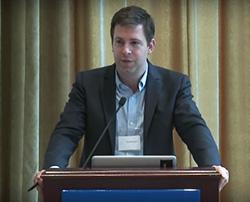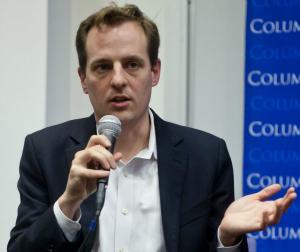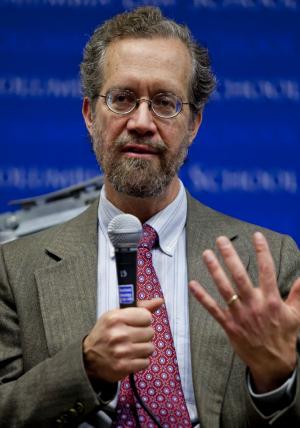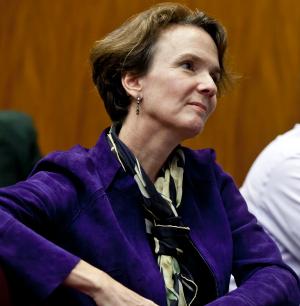Lifting the Veil: The Challenge of Covering Secret Government Activities
Journalists say government secrecy is too expansive in panel moderated by Associate Professor David Pozen
New York, December 6, 2012—Recent prosecutions of government and military officials who have leaked classified information to the media threaten to upset the balance between secrecy and a free press in coverage of national security issues, New York Times reporter Scott Shane told Columbia Law School students, faculty, and guests at a panel discussion hosted by the Roger Hertog Program on Law and National Security.
| Associate Professor David Pozen |
Shane was joined on the December 4 panel, “Lifting the Veil: The Challenge of Covering Secret Government Activities,” by his colleague, Charles Savage, a Washington correspondent for The New York Times. Associate Professor David Pozen moderated the discussion after brief introductory remarks by Professor Matthew C. Waxman, co-chair of the Hertog Program. Pozen, a former special adviser to the U.S. Department of State’s Legal Adviser Harold Hongju Koh, is working on a paper about government leaks and is teaching a new course—Law of Government Secrecy—at the Law School this semester.
“There’s been an understanding through many administrations, Democratic and Republican, that the secret activities of government need to have some coverage, that there has to be sort of some wiggle room in the ability of officials to talk about classified things,” Shane said. “That consensus is now threatened.”
| Charles Savage of The New York Times |
Savage, known for his Pulitzer Prize-winning coverage of presidential power, described efforts to learn more about the Patriot Act through Freedom of Information Act requests and lawsuits.
“I’m particularly interested in the notion of secret law… executive branch lawyers in secret deciding for themselves what the law means… but not making those interpretations public,” he said.
Shane told the audience that national security issues are “grossly over-classified.”
“As a reporter, you’re often in the rather peculiar position of asking someone to break the law to help you with your story,” he said. “It can be very frustrating, very daunting.”
But journalists are successful in gathering material for their stories, including through on the record comments and tips on classified information provided on background by government officials.
| Scott Shane of The New York Times |
Shane said the recent prosecutions of leakers—including Pfc. Bradley Manning who faces military charges for leaking troves of diplomatic cables to WikiLeaks—have had a chilling effect on journalists’ work.
“I must say that these… prosecutions strike me somewhat as ‘monstrous and hypocritical,’” he said, quoting former New York Times editor Max Frankel, who submitted an affidavit to the U.S. Supreme Curt in the Pentagon Papers case.
After brief remarks by Shane and Savage, Pozen asked the reporters about the current climate surrounding leaks compared to previous generations.
Shane said the relationship between reporters and the government officials and agencies they cover is much less cozy than it once was, referencing Frankel who claimed to have gone swimming in President Johnson’s pool.
“I must say, speaking for myself and probably for Charlie, we’ve never been in Obama’s swimming pool,” he joked.
| Professor Trevor Morrison '98 |
During the audience Q&A period, Professor Trevor Morrison ’98 suggested efforts to obtain classified documents—if successful—might mean government lawyers would be less likely to write down their advice out of fear it would be prematurely released to the public. Along with Waxman, Morrison is co-chair of the Hertog Program. He spent 2009 serving in the White House as associate counsel to the president.
Shane, who has covered U.S. drone strikes, agreed there might be downsides to the pursuit of classified information but said government secrecy is too expansive.
“It’s really pretty remarkable that we have embarked as a country on this program of targeted killing in now three countries on a fairly significant scale and there’s never been a public debate in Congress about this,” he said. “I think the costs of secrecy are considerable to the democratic process.”
| Professor Sarah H. Cleveland |
Professor Sarah H. Cleveland noted that vast amounts of classified information, including about the drone program, are reported on daily despite the fact that very little of that information is officially acknowledged by the government in order to preserve legal defenses. Cleveland served as the counselor on international law to Legal Adviser Koh in the State Department from 2009 to 2011.
“It leads to fairly extreme cases of what I like to call publically classified information,” Shane said. “The extremes make the government a laughingstock and certainly don’t encourage respect for classification under the law.”




